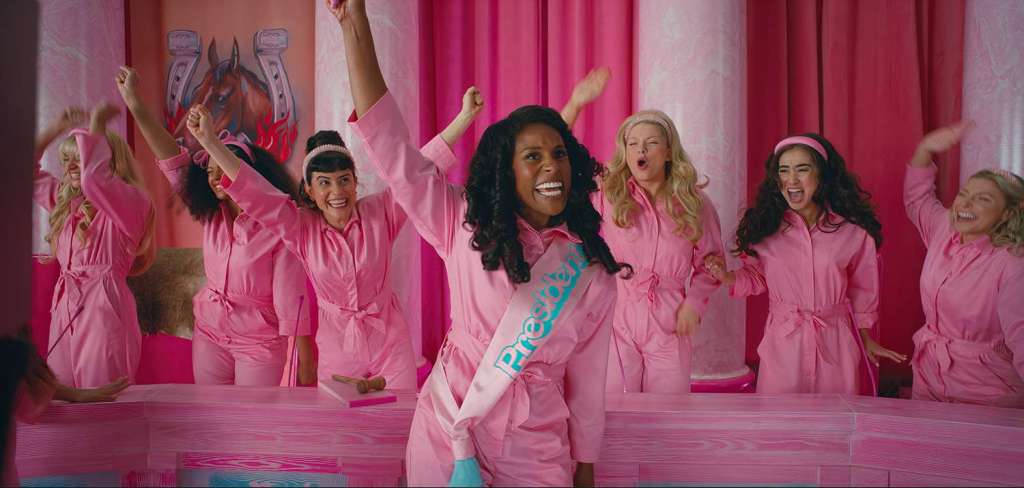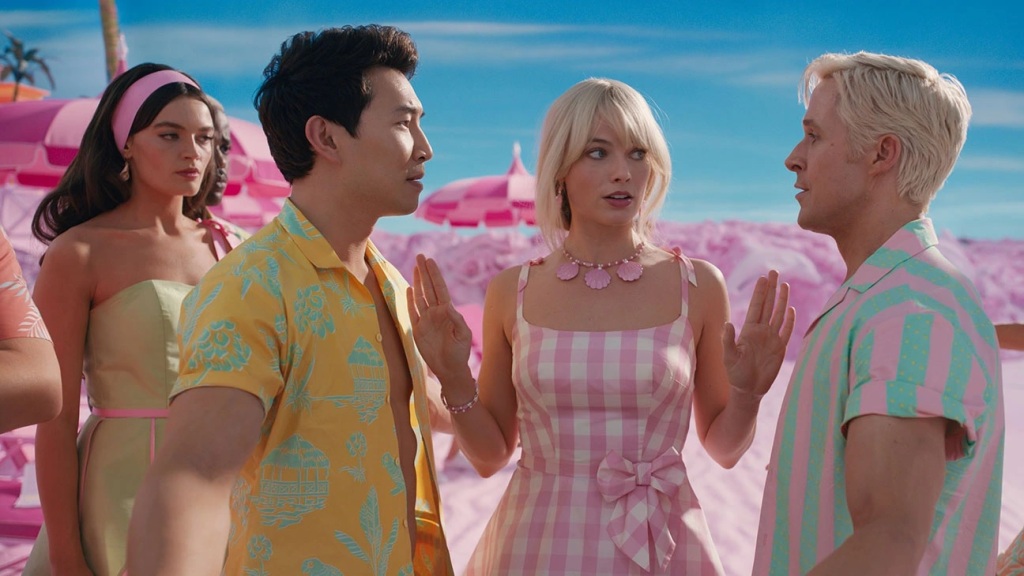
What ultimately disappointed me about The Super Mario Bros Movie was that it contained nothing new or unexpected, give or take a Jack Black song that – despite being a pernicious little earworm – is barely a song at all. Mattel, a toy company, isn’t going to shock me with its desire to sell more toys, any more than Nintendo trying to sell more games, or Hasbro smashing toy robots together. But movies are still a medium of stories and characters who will, at some point, have to explain to me why I should bother watching what amounts to a two-hour toy commercial, and the Barbie doll’s position as an iconic but dated piece of Americana doesn’t obviate that requirement. So you can imagine my delight when director Greta Gerwig (with a script co-written with frequent collaborator Noah Baumbach) decided to play with a broad and inclusive set of dolls, all singing and dancing a medley of existential dread on the border between Barbieland – a plastic, pastel fever dream (beautifully realized by veteran production designer Sarah Greenwood) where Barbie’s in charge and Ken is surplus to requirements – and the real world, where the Patriarchy is alive and well; we just hide it a bit better than we used to. It’s not much of a boast to say I’m less of a fragile little bran muffin than Ben Shapiro, whose vague fleshy blob turned instantly to windblown ash the moment the P-word was uttered in dialogue not once, but a baker’s dozen times. But if you’ll indulge me a problematic compliment, I was genuinely delighted to see that this toy commercial had some fucking balls. Because while my cynical side will assume that Mattel approved every image and sound that appears on this screen, and corporate feminism always exists with a degree of self-aware marketability, it’s hard for me to imagine that having a modern child (Ariana Greenblatt) tell Barbie to her crying face that she’s the dumb, fascist scion of a vapid and environmentally destructive consumer culture was their first advertising choice. In truth, it was their 43rd choice. But it’s one I found myself happy that they troubled to make at all.
Following an amusing satirical nod to the opening of 2001: A Space Odyssey, we start in the Dream House with Barbie (Margot Robbie), a narrative device reminiscent of The Lego Movie and Monsters, Inc., as we learn that Barbieland exists in a loose, metaphorical parallel with the Real World, with each Barbie corresponding to a real human child’s toy. Robbie, the tall, blond original model, is referred to in dialogue (by herself and others) as Stereotypical Barbie, with every other woman in this world also claiming the Barbie name, from President Barbie (Issa Rae) to Dr. Barbie (Hari Nef) to various Mermaid Barbies (Dua Lipa). There is also Ken – whose original (generic white beefcake) model is played by Ryan Gosling, with the narrator (Helen Mirren) informing us that the only thing that determines whether he has a good or a bad day is whether Barbie smiles at him – a bleak existence that is presented as such. This motivation unites all of the Kens, played by other beefcakes like Simu Liu, Kingsley Ben-Adir, and – briefly, in Merman form – John Cena. Between their cloying pursuit of the female gaze and various machismo contests on the Beach (in which they offer to “beach [each other] off” repeatedly), the Kens live a vapid and ill-defined existence, with no real place to go when the nightly dance party concludes at the Dream House, and the nightly Girls’ Night slumber party begins anew. Barbie and Ken play at romance as devised by a toddler, kissing with free-floating faces near each other, and “being boyfriend-girlfriend” with only the vaguest notion of what that actually means. Although they’re both quite clear on their physical limitations, with Robbie’s Barbie dutifully informing a few catcalling real-world construction workers that she has no vagina.

The key detail about Barbieworld is that it is a perfect, happy, feminist utopia where…literally nothing is at stake. Barbie’s food and drink are all automated play-objects that she doesn’t really need to consume. Dr. Barbie displays a heart-shaped x-ray of a minor Ken injury, but heals it with the ease of a child’s narrative handwave. President Barbie is the president of dancing and wearing sashes. But make no mistake – women and girls are in charge of Barbieworld, and men are their dutiful, superfluous sidekicks. And it is that unstable malaise that kicks off Barbie‘s plot: Stereotypical Barbie ends her nightly dance party by asking some of the other Barbies in the room whether they ever think about dying. And then her permanently high-heeled feet collapse into flats, she notices cellulite on one of her thighs, and she’s immediately sent to go see Weird Barbie (Kate McKinnon), her oddball fairy godmother with a messy, multicolored hairdo, doing permanent splits – perhaps a metaphor for adulthood, feminist awakening, queerness, or all of the above – to explain what she must do: Journey to the Real World and connect with whichever human child is playing with her wrong, a girl named Sasha (Greenblatt), who greets her with the devastating takedown I mentioned above.
Barbie’s Real World mission gradually expands to include Sasha’s world-weary, millennial mother, Gloria (America Ferrera), who deals with her existential ennui about the dolls she used to play with (and a tween daughter who wants nothing to do with them) – by working at Mattel and sketching dark and fucked-up little doodles of the Barbies she dreams about now. Cellulite Barbie. Fear of Death Barbie. Barbies who are allowed to pause for a moment and consider what the world is like if everything’s not perfect all the time. When Barbie finally meets Gloria, it’s in the course of discovering that Mattel, and the world it exists in, is run by men and the patriarchy, who hold all meaningful positions of power and advance their own ambitions at the expense of anyone who challenges their vision of how they should continue to hold that power. With Donald Trump and the entire Republican coterie of lifetime-appointed priest-kings a full year into their experiment with taking women’s reproductive rights backward half a century, this should not be a controversial position for anyone other than the right-wing cohort whose paychecks derive from performative outrage at people describing the world as it is. At the same time, even for a sympathetic audience, merely mentioning the patriarchy or Barbie’s desire to smash it wouldn’t have been enough by itself. An insubstantial and inconclusive riot grrrl vibe tanked my enjoyment of Amy Poehler‘s Moxie, which ultimately felt more like the ghost of 90s feminism’s past, rather than a story with anything useful or interesting to say about the modern world.

Instead, Barbie posits and persuasively argues for a common fourth-wave feminist talking point: That the patriarchy is harmful to men and boys as well as women and girls and everyone in-between. Given the film’s dutiful fourth-wall breaking, I’ll go ahead and lay my Low-T, Beta Cuck cards on the table here: I simultaneously believe this talking point is a piece of realpolitik coalition-building on the part of feminists hoping to make disinterested men give a shit about their cause – and that it’s objectively true, so I don’t really begrudge its functional purpose. The patriarchy is real, describing a system of historical, social control that empowers and benefits men in a huge and tangible way, but ultimately harms those same men by slotting their range of possible outcomes and identities into a handful of stifling archetypes, limiting their ability to ever truly know themselves and explore the full range of who and what they could be within a mutually supportive community of other men, women, and enbies who are free to do the same. The film begins by displaying a topsy-turvy fantasy world in which women are in charge, but there’s precious little to be in charge of, and even in that place, we still get a sense of how harmful the situation is to the Kens who don’t know their place, nor particularly have the mental wherewithal to consider it at all. To wit, Barbie begins with a cartoon matriarchy and says that’s Bad Too, Actually, before it even considers what the real world is like. When Gosling’s Ken finally sees the Real World, he is instantly taken in by it – men are men (and occasionally men on horseback), constantly supporting and high-fiving each other as they prop up a world they unapologetically rule over. As Barbie is learning about catcalling and sexual harassment, the script is positing, through the eyes of its most naïve and corruptible character, Ken, that the patriarchy is seductive. And as the patriarchy roils forth to corrupt Barbieland, it somehow doesn’t feel like it’s calling out anything that wasn’t always there in both worlds. Even as Barbie’s real-life creator Ruth Handler (Rhea Perlman) appears as a wandering spirit to confess the unachievable dream she was always selling with her creation (even calling out her eventual SEC charges and removal from the company), the film digs deep into Mattel’s archives to show us some of the gross shit Mattel was engaged in as recently as 2009, when it introduced…Sugar Daddy Ken (Rob Brydon), or 40 years earlier, when it released a Skipper (Hannah Khalique-Brown) whose boobs inflated with the crank of an arm as she grew up into a “tall, slender teenage doll“. Despite the presence of Will Ferrell as a business guy in both films, Barbie goes a step beyond The Lego Movie in arguing that despite multiple chipper song and dance numbers tooting a similar horn, everything was not awesome in Barbie World or ours to begin with, and a return to the status quo in either one will not be nearly as useful as characters who can speak honestly about the sinking feeling and cognitive dissonance they experience just trying to exist.
Gloria is ultimately handed the megaphone to make this point, and Ferrera delivers this monologue beautifully, laying out a litany of dysfunctions and contradictory expectations that come with being a modern woman. And as the badass boss bitch who sits directly outside the all-male board room at Mattel, Gloria is precisely the flawed avatar that this point deserves, because she’s a character that props up a system that she knows was harmful to her own childhood, but is ultimately just an ordinary woman trying to get through the day, take care of her kid, and participate in a system that she had little say in setting up, without ever feeling like a monster or a failure or a hypocrite. It’s an impossible standard. And for Ferrera to express it in a way that simultaneously feels relatable and sympathetic for a modern, multi-gender audience is a real achievement. Because a girly movie with something to say…which is only seen and heard by girls…isn’t accomplishing nearly enough (even if it manages to bring in a few terminally online film nerds who crafted an unlikely juxtaposition with a dour historical drama). And while Robbie’s Barbie does close the show (with a line I still can’t believe the movie had the audacity to end with), she spends a fair few lines acknowledging that this wasn’t entirely or even mostly a story driven by her version of Barbie. Barbie the film knows what these dolls are and what they’ve represented in American society, and it acknowledges that history in more than a tokenistic way, speaking less about the dolls themselves and more about the oppressive system for which they always functioned as brand ambassadors. Don’t just be a girl. Be this girl, with her waist-length blond hair and giraffe neck. Gloria gets it. And she tells the audience what’s what so smoothly that it stops just shy of being didactic or punitive to any dudes who showed up, voluntarily or with some encouragement, because ultimately all I felt from Gloria was a desire to cut herself and myself some slack about what society expects us to be. Because life in plastic…ain’t fantastic.
FilmWonk rating: 8 out of 10
Pingback: FilmWonk Podcast – Episode #206 – “Barbie” (dir. Greta Gerwig), “Oppenheimer” (dir. Christopher Nolan), “Asteroid City” (dir. Wes Anderson) | FilmWonk
Pingback: 2023 Glennies (Top 10 Films of 2023) | FilmWonk